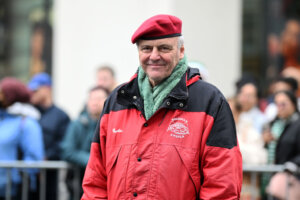NYC mayoral candidate Curtis Sliwa on August 27, 2023. Photo by Michael M. Santiago/Getty Images
Zohran Mamdani’s Jewish dilemma has dominated headlines, but the Republican facing the Democratic nominee in the general election for New York City mayor has his own history of troubling statements about Jews.
Curtis Sliwa said in an interview this week that apologizing is his strength to overcome his vulnerabilities with Jewish New Yorkers and defeat his Democratic rival.
The founder of the Guardian Angels volunteer safety patrol and longtime radio personality also said he’s not interested in the anti-antisemitism playbook deployed against Mamdani by both former Gov. Andrew Cuomo, who came in second in the primary, and incumbent mayor Eric Adams. “Weaponized” identity politics turned out to be a dud, he said.
“Cuomo already dropped B-52 bombs on him that didn’t put a dent in him,” Sliwa said, referring to relentless attacks on Mamdani’s long record of anti-Zionism and strident criticism of Israel.
Mamdani officially secured the nomination on Tuesday after ranked-choice results released by the city’s board of elections showed him defeating former Governor Andrew Cuomo by 12 points — 56% to 44%.
Sliwa, whose trademark red beret is a familiar New York landmark, is running again after losing to Eric Adams in 2021 with just 28% of the vote in a heavily Democratic city.
Adams is seeking reelection as an independent, hoping to block Mamdani, a democratic socialist, from running City Hall. Sliwa is ignoring calls to step aside and consolidate the anti-Mamdani vote, even as recent polls show him drawing between 16% and 11% in a multi-candidate race.
Sliwa’s decades of brash talk radio have left a trail of controversial remarks that could complicate efforts to win over voters uneasy with Mamdani’s socialist views and stance on the Israeli-Palestinian conflict. He won a majority of the vote in the Orthodox-populated Borough Park neighborhood in 2021, but lacked support in other Orthodox neighborhoods, where Adams had cultivated close relationships. This year, Adams is running on an “End Antisemitism” ballot line. Some Hasidic sects that endorsed Cuomo in the primary have already indicated they would support Adams in the general.
In 2018, Sliwa portrayed Hasidic Jews — who vote in the Democratic primary as a bloc but typically support Republican candidates in statewide and federal races — as power-hungry, outside the bounds of “normal” American life and “buying off” politicians.
He also claimed that Hasidic Jews are “making babies like there’s no tomorrow” to collect government benefits. Sliwa, a Polish Catholic, told an Israeli reporter last year that antisemitism runs in his DNA as a non-Jew. “You need to wake up and understand that we always blame the Jews, no matter what happens,” he said. “I gotta catch myself from time to time.” (Sliwa has two Jewish sons who are being raised as Jews by their mother, Melinda Katz. She and Sliwa are no longer a couple.)
Sliwa had already expressed regret about his 2018 remarks. He reiterated his apology after allies of the embattled mayor resurrected his remarks on social media and on Hasidic community WhatsApp groups.
He called his 2024 comments about antisemitism being in his DNA a “poor choice of words” that he immediately realized were wrong. “The first person to confront me about that was my wife, who’s a Gentile,” Sliwa said. He clarified that he meant that antisemitic attitudes are often absorbed in non-Jewish homes from an early age.
Dov Hikind, a former Brooklyn assemblyman and head of Americans Against Antisemitism, defended Sliwa. Hikind said he hosted Sliwa and his wife, Nancy, for Shabbat dinner last month and understood him to be describing “the sad reality we are all watching unfold in America and around the world with Jew hatred,” that Jews must ultimately rely on themselves. “The guy is not perfect,” he said. “I’m not going to say he’s 100%, but he’s pretty close.”
Sliwa’s baggage

Sliwa, the founder of the Guardian Angels, the citizen group that has patrolled New York City streets for more than 40 years, is familiar with Jewish fears amid rising antisemitism.
Sliwa deployed the Guardian Angels to Crown Heights for a month in 1991, after a car in the Lubavitcher Rebbe’s motorcade struck and killed a Black child, sparking riots and the fatal stabbing of Jewish student Yankel Rosenbaum.
The unrest injured more than 200 people and caused major property damage, with Jewish leaders accusing Mayor David Dinkins of restraining the police and failing to protect the community — a factor in Dinkins’ failure to win reelection. The Guardian Angels returned to patrol the neighborhood in early 2020 amid a rise in antisemitic attacks.
Despite the patrols, many Jewish voters, particularly in the Hasidic communities in Brooklyn, fixate on Sliwa’s record of inflammatory rhetoric.
In 2013, he said that Jews need to be “tough” to survive, warning that those who aren’t will “get turned into speed bumps.”
In a 2018 speech to supporters of the Reform Party, which he once chaired in New York, Sliwa lashed out against the Hasidic community as controlling interlopers. “They don’t vote the way normal Americans vote,” he said. “They’re being told by the rebbe or rabbi, ‘This is who you vote for’… The politicians are rolling over for them. Why? Because they contribute, the big machers who write the checks and the checks don’t bounce.”
Agudath Israel of America condemned Sliwa and accused him of antisemitism.
He has also clashed with Orthodox leaders over yeshiva education. In a televised debate during the GOP primary, Sliwa said that he doesn’t think the Bill de Blasio administration did enough to enforce state guidelines requiring private school education to be “substantially equivalent” to instruction at public schools.
Speaking to the Forward after he clinched the nomination, Sliwa doubled down. “The rules are the rules for everyone,” he said. “If parochial schools and religious schools that are not ultra-Orthodox or Hasidic have to follow those rules, then everybody does. We can’t start making exceptions.”
Sliwa said then that he was shocked that Orthodox leaders would not meet him to consider his candidacy. “I would have thought that just out of respect for all that I’ve done in the Jewish community over the years, they would have at least provided me with the opportunity of making a presentation,” he said.
In a 45-minute interview on Tuesday, Sliwa acknowledged that his decades as a talk radio host have left a trail of comments he regrets. “I’ve said a lot of things I shouldn’t have,” he said. “What I’ve learned in life is the art of apology. You have to understand the hurt that you cause people, and you have to apologize and mean it.”
He also said that he’s been forthright about his shortcomings and showed up when it counted. “When Jews were targeted by hate and people wanted to commit acts of violence, it didn’t matter where they were,” Sliwa said. “They could always depend on the Guardian Angels and me.”
He contrasted his public apologies with Cuomo, who reportedly “expressed deep regret” for singling out Hasidic communities for enforcement during the COVID-19 pandemic. “That was good of him,” Sliwa said. “I just wish he’d done it publicly.”
He added: “I am not perfect. But then again, when I get confronted, I don’t run.”
Staying in the race

Sliwa is staying in the race, predicting that Cuomo will mount a late summer independent bid. He touts endorsements from top New York Republicans, including Reps. Elise Stefanik and Mike Lawler, who have called Mamdani “antisemitic.” Lawler and Stefanik are both considering running for governor next year and have used their congressional pulpits to make a priority of the fight against antisemitism, particularly on college campuses.
Sliwa, in his campaign, has expressed support for Israel. He said in the interview that Mamdani must explain his defense of the phrase “globalize the intifada.”
“You must never let up on that,” he said, referring to the phrase many Jews see as a call to violence. “But don’t think that and that alone will cripple him.”
Sliwa credits Mamdani for securing a path to the nomination with his appeal to younger voters struggling to afford life in the city. Sliwa created a separate independent ballot line, the “Animal Welfare” party, to attract Gen Z and millennial voters who would not otherwise back a GOP candidate. A longtime animal advocate, he fosters more than a dozen rescue cats in a 320-square-foot Manhattan apartment and has called for a “no kill” shelter policy citywide.
Sour pickles and rigged matzah balls

For four years in a row, in the mid-1990s, Sliwa was the sour garlic pickle-eating champion of the world. He first won the title in 1994 while recovering from gunshot wounds, encouraged by 2nd Avenue Deli founder Abe Lebewohl to represent the Lower East Side. “I just kept eating,” Sliwa recalled, beating “monsters from Ukraine, Russia, and Poland.”
In 2002, Sliwa came in second place in the annual matzah ball eating contest at Ben’s Kosher Deli in Manhattan, only to be disqualified when he was caught squishing the matzah balls to get the liquid out.
He said he defended himself to Raoul Felder, the renowned Jewish divorce lawyer who was watching the contest. “I didn’t grow up eating matzah balls,” Sliwa recalled telling Felder. “I grew up eating meatballs. This is the way a gentile eats matzah balls.”
In a 2021 interview with the Forward, Sliwa did not hesitate when asked to reveal his favorite Yiddish word. It was schmendrick, a term used to describe a pathetic or foolish person. “It is my favorite word I love to use many, many times to describe politicians that I have to listen to,” he said.

